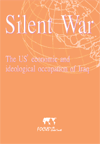03/03/2005
Under: 1Post Types, Publications
This selection of articles focuses on the US’ ideological and economic occupation of Iraq: a form of occupation that may well outlast its military presence. Using its own agencies such as USAID and foundations such as the National Endowment for Democracy, or by sub-contracting to private companies like the Research Triangle Institute, the US has systematically set about promoting its own model of liberal democracy through training “community leaders”, publishing school books, funding NGOs and running “democracy” workshops, while at the same time systematically banning and marginalising other political and civil formations. This is nothing new.
The principal difference over the years has been the relative balance between isolationism and internationalism, and unilateralism and multilateralism. In the past, pragmatism, bipartsanship and a lingering sense of moral responsibility (as opposed to moral superiority) has guided, and to some extent constrained, the stance adopted by the US. In the era of George W. Bush, though, it seems there are no limits to the means the US will use to secure its interests, most recently and bloodily in its illegal invasion and occupation of Iraq. Walden Bello sees this as a sign of an Empire “on the ropes” as he argues in the first article of this collection.
The pattern emerging in Iraq, as revealed in the article by Herbert Docena, has been tried and tested elsewhere, as Alejandro Bendana and William Robinson describe in their articles about Latin America.Beyond the imposition of ballot box democracy, the US has also used its position as occupier to restructure the Iraqi economy into a paragon of open borders and free markets at least on paper. Using the powers he assumed as head of the Coalition Provisional Authority, L. Paul Bremer signed-off on a raft of economic laws that create the framework for a neo-liberal paradise, including the expropriation of intellectual property rights, as described in the article by Grain and Focus on the Global South, and a foreign direct investment regime that gives extraordinary benefits to foreign capital.
Through fiat, the US has achieved concessions far in advance of anything that Iraq as a sovereign nation would be obliged to accept through the WTO or bi-lateral investment treaties. As Marylou Malig says in her article, the US has gained a free trade agreement without the bother of negotiations. The historical term “uneven treaty” takes on a whole new meaning on the context of Iraq.
The final article in this collection, by Shalmali Guttal, looks at post-conflict “reconstruction” experience in countries as diverse as Haiti, Cambodia, and Iraq. The emerging pattern is of an overtly political process which takes place squarely within the neo-liberal economic paradigm and the US model of liberal democracy.
Almost inevitably, these efforts both create and perpertuate existing inequalities, sometimes spiralling into the very problem of “governance failure” that it seeks to remedy in the first instance. In spite of the rhetoric, vital questions of sovereignty, democracy, and self-determination are completely ignored in the new reconstruction paradigm.The durability of attempts to re-structure Iraq’s economic and political landscape seem rather fragile given the almost universal opposition to the occupation and in the light of the resounding failure of other “reconstruction” adventures.
However, given that success in Iraq is central to George W. Bush’s imperial worldview, and the proven inability of the dominant class to learn from their mistakes, they are not about to give up quickly or quietly.






